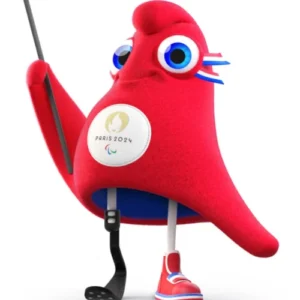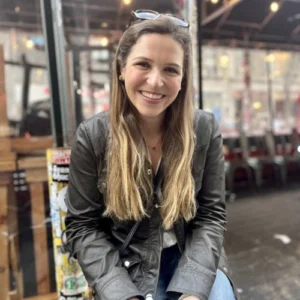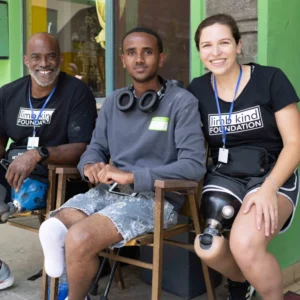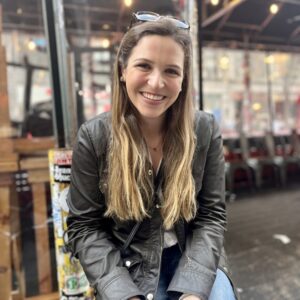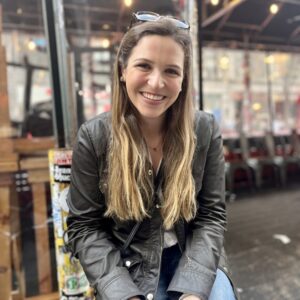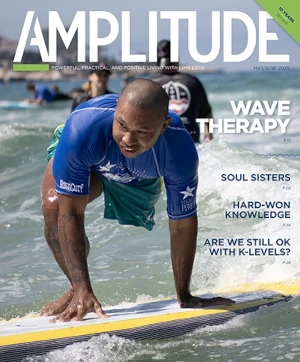by Alexandra Capellini
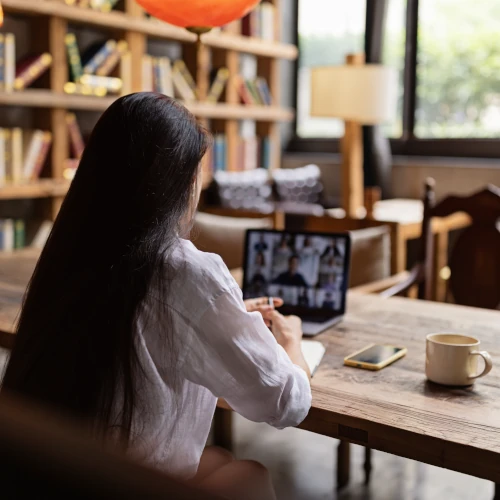
When the Amputee Coalition asked me last summer to lead its new virtual Young Adult Support Group, I felt as if Fate had stepped in.
Throughout adolescence, I made friends and connections as a camper at the Coalition’s annual youth camp. I extended that network as a dedicated camp counselor. But as my peers and I aged into our mid-to-late 20s, COVID-19 disrupted camp timelines and routines, and I began to feel disconnected from my fellow amputees. Our counselor friend group could no longer count on reuniting at Youth Camp every summer in the ways we had before. The Coalition’s National Conference continued, but it largely attracts a different generation of amputees. Where were the opportunities for young adults to connect?
Enter the Coalition’s virtual Young Adult Support Group, a free monthly Zoom chat for amputees 18 to 32 years old. It was designed as a safe space for young adult amputees from around the country to discuss the ins and outs of life with limb loss. When the AC asked me to lead the sessions and facilitate meaningful conversation. I signed on without any hesitation. I know this community, and I am personally invested in building a broad network of young adult amputees who can turn to one another for guidance, support, and friendship.
Our first few sessions were small. Then word began to spread, and people began joining from all over. We gained members from New York, Tennessee, Michigan, Texas, Rhode Island, New Jersey, Florida, Wisconsin, and beyond. The geographic diversity was matched by the wide range of experience with limb loss. Although we never ask anyone to share how they became an amputee or how long ago they lost a limb, most people do share this information. Some of our participants are new amputees whose surgeries occurred less than three months ago. Others have been amputees for years. Some lost limbs to cancer or trauma, others to infection, and others were born with limb differences.
Initially, I was worried about getting the conversation to flow. After all, I was bringing strangers together onto Zoom to discuss something quite intimate: what it feels like to live with limb loss. But I shouldn’t have been surprised by how quickly people began to open up with one another. Nearly every person who joins our Zooms will tell you they haven’t seen another amputee that day, week, or month. The group has become a space to talk to other people near our age who look like us. Trust developed quickly, and nearly everyone now feels comfortable letting their guard down and opening up about the highs and lows of their lives.
Topics of conversation have flowed quite naturally and cover nearly every aspect of amputee experience. With the warmer months approaching, we’ve discussed what it feels like to transition into shorts, skirts, or dresses. These are the times of year when limb loss is most obviously on display, which means we get stared at more often in public. Some of us have gone through this for years; others are approaching their first summers with limb loss. When newer amputees in our group asked how to handle “summertime stares,” it gave rise to some great conversations about how the stares make us feel, why they provoke certain responses, and what these reactions mean about our overall body image. None of us can change how others will react to us in public, but each of us can take charge of how we respond to that experience. When we can internalize kindness toward our current bodies, we can more easily dismiss public stares. They don’t have to weigh on us. They don’t have to throw us into a negative headspace. Reading about this can be helpful, but hearing somebody describe it strikes a more powerful chord. It is much easier to develop healthy habits when you have a direct relationship with some who’s already practicing them.
It’s also easier to understand your own experience when you hear from other amputees who have similar, but not identical, perspectives. I and most of the lower-limb amputees in the group have met other lower-limb amputees at our prosthetists’ offices. But as upper-limb amputees have joined our meetings, I’ve learned that their experiences can be quite different from mine. Many of them choose not to wear a prosthesis, so they rarely if ever visit a prosthetist—which is one reason I’ve met fewer of them. The support group gives everyone opportunities to meet amputees we would otherwise never have the chance to learn from.
The variety of perspectives has led to some great conversations. The subject of sports and recreation comes up often. We’ve talked about national organizations that provide good opportunities for adaptive recreation, what physical activity can look like for amputees, and how to overcome the mental, financial, and logistical obstacles. Most of us don’t desire to compete nationally or get into the Paralympic pipeline. We just want to integrate sports and fitness into our lives on our own terms. And most of us are finding good ways to do that.
As young adults, many of us are navigating life changes and big moves, so we also talk frequently about self-advocacy. We discuss things like how to make your bathroom safe and accessible; how to speak up about accommodations at work; how to approach your prosthetist with a concern; how we pace ourselves at work, since lower-limb amputees use so much more energy to walk around than our nondisabled peers. We have examined the nuances of how to disclose disability on school or job applications. Our hour-long sessions each month fly by.
After logging off our meeting each month, I am left with deep appreciation. Navigating limb loss as a young adult is a massive undertaking. It would be easy to feel lost and overwhelmed. It is one challenge to make the best use of resources available to us; it is another challenge to actually find those resources. What has made this entire journey manageable is community. We are figuring this out together, and we are sharing the resources that have helped us along the way.
So if you (or someone you know) are a young adult, aged 18-32, living with limb loss/limb difference in the United States, come join the conversation. The group meets the third Thursday of every month; the next meeting is May 15. You can register for free at this link. Hope to see you there!
Alexandra Capellini is a resident physician at the University of Michigan Hospital in Ann Arbor.


